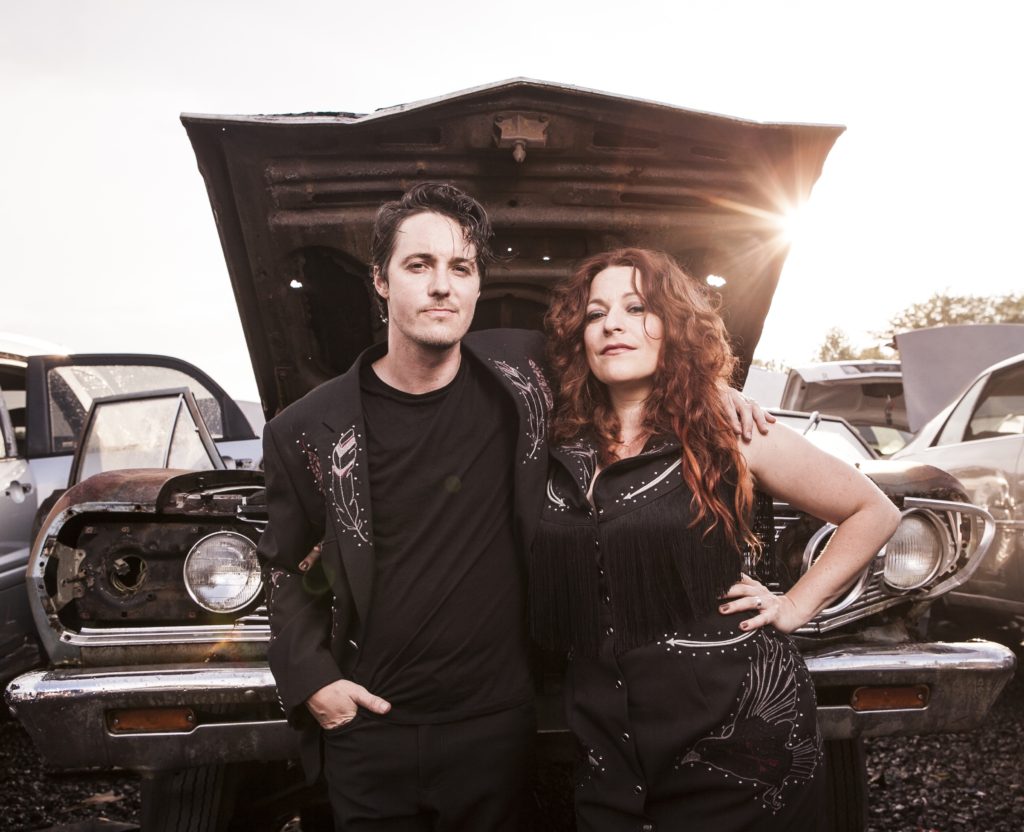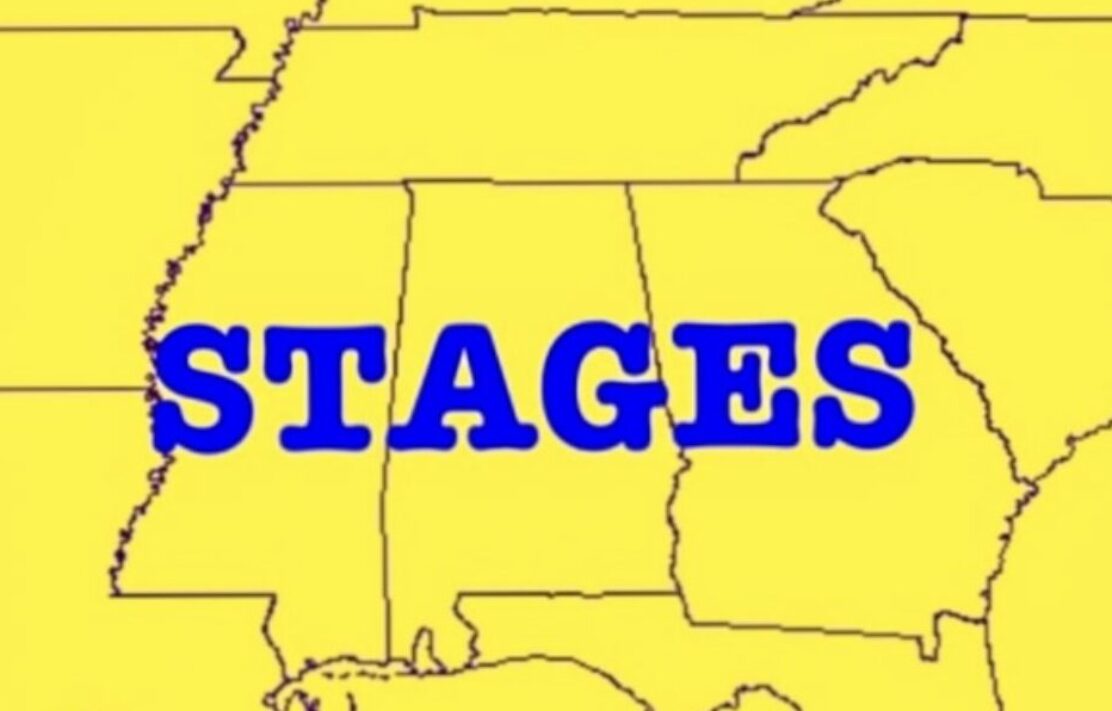By Blake Ells

Photo Credit: Leslie Ryann McKellar
Shovels & Rope is the duo of Cary Ann Hearst and Michael Trent who had been performing as solo acts and – on a fateful evening in the Magic City – decided to become one. The duo just released Busted Jukebox, Vol. 2 which features cover collaborations with an impressive roster of their peers that includes Brandi Carlile and John Moreland.
Before their return trip to a sold-out show at Iron City, Hearst and Trent talked about that night in Birmingham that was the genesis of the band, what the song of the same name meant to them, the new record and about leaving Nashville to make it in the music business.
Birmingham Stages: The first major hit you broke through with was named after our city. Has that affected your relationship with the City of Birmingham?
Michael Trent: People get really excited when we play that song in Birmingham. Anytime you play a song that mentions the name of a place at that place people get very excited.
Cary Ann Hearst: It’s always awesome.
MT: If we could do that once for every state, we’d have it made.
CAH: We have a storied history with Birmingham. Hell, we came up and we played at The Nick. We played at the BottleTree. We played at the Zydeco. We played a lot of great venues as we came up through the ranks over the years. Our band was basically formed out of a gig that we played with Deer Tick and J. Roddy Walston. I can’t remember…
MT: I think it was at Zydeco.
CAH: Yeah, it was Zydeco. On the way to that gig, we had talked about how we were gonna suss out what we were gonna do. Is this a good idea? Should we give it a shot? So in that sense, the connection we have to this city is very sentimental. It’s not so much about the song as it is the experience that song kind of ended up being about and somewhat alluded to—Birmingham’s a trip, man. It’s got a storied history and it seems like it’s changing and my best friend is living there right now. We’re looking forward to getting down there and seeing Duquette [Johnston] and his wife.
Birmingham Stages: I didn’t think it would be possible to top Busted Jukebox, Vol. 1, but you may have done it with Busted Jukebox, Vol. 2. How did you curate those records? How did you choose the artists that you’d cover them with?
MT: We did do it! We topped it, right?
CAH: [cheering]
MT: Those records were really fun to make because there was absolutely zero pressure behind it. We started just doing it for fun as a creative exercise and we’re always thinking about artists that it would be fun to collaborate with on a song that nobody would expect. It probably just gets more and more out there as we go. We kinda went for it with the asking this time; we asked some people that we were probably too scared to ask the first time around, and people said yes. That’s not to say that we’re not excited about the people that are on the first one. But you know, we had meant Rhett Miller along the way; we had friends of friends of Nicole Atkins. We’ve known Lera Lynn since…
CAH: Way back.
MT: …way before we were even a band. We just kind of decided to take it into space.
Birmingham Stages: How did you choose the songs?
CAH: It’s fun to choose a song that’s definitely not an obvious choice; a great song from your past that you have some kind of connection to. All of the songs are songs that you have some kind of connection to; it can’t be just finding a deep cut or finding one that you know is gonna work. If you find the right combination of a song—a random, great song that you love and that you actually have a cool vision for—then it goes with a certain artist that you happen to be friends with or at least you’re friendly enough with them that you are comfortable asking them to collab—and these collabs happen across the internet from city to city. It’s not like we’re getting in an intimate…they’re alone in a room and I’m alone in a room and we have that exchange.
It’s just a little bit of kismet in that regard; songs that we’re attached to. Both of us love the song “Epic.” I remember having kind of a transcendent experience as a young kid listening to Faith No More’s “Epic.” The production had a bit of datedness in it…
MT: Oh yeah…
CAH: But a good song is a good song, and you can put a dress on it and…
MT: I feel like maybe our ‘90s are showing a little bit on this record [laughs]. If we have a personal connection to it, it doesn’t even matter. The opening song—probably 100 people had heard that song before this. It was written by a friend of ours that’s basically just a great songwriter—he doesn’t go out and tour. He’s a teacher. But it’s a really cool song, and it gave us a chance to get a powerhouse like Brandi Carlile to sing this guy’s song, and that’s really satisfying for us. [Note: The track is a cover of Bill Carson’s “Cleanup Hitter.”]
Birmingham Stages: Similarly, you’ve curated the High Water Festival in Charleston. How has that festival impacted your city economically?
CAH: That’s a good question. I don’t know what the direct economic impact has had on North Charleston, which is the third largest city in the state of South Carolina and it’s the next city over from Charleston itself. That community was super cooperative with us. They were excited to work with us and believed that it could bring—I’m not going to say much needed business, because they are doing business. North Charleston is great to do business with. But they were eager to have whatever economic impact it would bring to the area. And Charleston isn’t short on tourism, but I think the hotels in North Charleston were definitely full of people that came from out of town. Of the metrics that we do have among 9,000 tickets, 6,000 of those were local Charlestonians, but 3,000 of those came from out of town. And they spent a lot of money. So that’s good. I hope it’s had nothing but a positive impact. The people that pay to see it enjoy its positive impact, and we’re also conscious of the environmental impact we have. It seemed like no one had anything to lose and everything to gain from the festival, and that’s good for us.
MT: The problem with a lot of festivals is that they start off being really great and then people want to make it bigger and bigger. “That was great! Let’s make it…twice as big next year!” Quality goes down because people begin trying to cut costs. It becomes a corporate thing where the fans usually aren’t benefitting. It was a surprise success last year and we just sort of want to keep it the same every year. It was a neat thing to be able to bring a lot of those bands out to Charleston. The people out here were really excited about it.
Birmingham Stages: Cary Ann, I think that you and Justin Townes Earle may be the only artists that are actually from Nashville, and you moved away. Why did you choose to leave?
CAH: I’ve had a quippy saying about that forever. I always say, I left Nashville to make it in the music business; Nashville is an awesome place to grow up—and I can’t speak to Justin’s upbringing, we met when I was in college, actually. The band that I grew up playing with became his band later. The reality is that it is replete with talent and everybody is chasing the same dream. There’s a lot of great people there and there’s a lot of…
MT: Traffic.
CAH: …there’s a lot of traffic [laughs]. Charleston, South Carolina has everything to do with the artist that I developed into being. I’m too lazy. I wouldn’t have made it in the business because it would have been too hard for my fragile little ego. I never would have been able to swallow my pride. I wouldn’t have had the grit to have survived in the industry there.
But I did have the time and the charisma and was paid adequately to justify that I could have gigs in Charleston, just playing music in bars almost every night of the week and have the best music people in the world to play music with. This town is insane for good music and good musicians. I’m definitely happy that I left Nashville to make it in the music business.
Shovels & Rope will perform at Iron City on Friday, February 9. Doors open at 7 p.m. and showtime is 8 p.m. For more information, visit www.ironcitybham.com.
